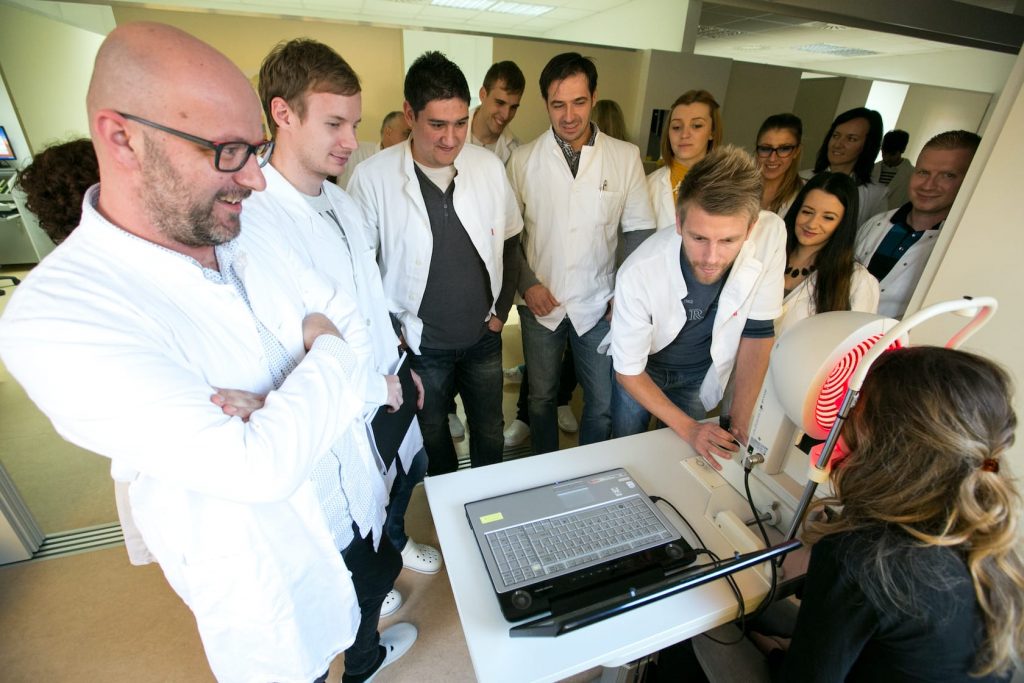Technological and lifestyle developments have led to an increase in the number of people relying on optical aids, and the demand for experts in the fields of eye optics and optometry keeps growing. This study programme gives you an opportunity to enter an interesting and modern field that offers numerous professional possibilities.
About the study
The Professional Graduate Study Programme in Optometry aims to address modern challenges and labor market needs, thereby contributing to the responsible and sustainable development of society. This program is the only one of its kind in the Republic of Croatia, organized according to the latest scientific knowledge and based on advanced professional skills. It is comparable to similar programs offered in EU countries.
The purpose of the study is to prepare qualified and competitive professionals capable of providing primary eye care, assessing visual functions and eye structures, recognizing refractive and functional vision abnormalities, prescribing and fitting visual aids (glasses, contact lenses, or special vision aids), applying vision therapy to restore balanced visual system functioning, advising on vision prophylaxis and ergonomic issues, and conducting scientific research.
Professional Competences: Students gain deep theoretical and practical knowledge focused on selected areas of optometry and related fields to enhance their ability to work in interprofessional teams, use modern techniques, and acquire the fundamentals of scientific work in the field. A graduate of this program can identify visual function requirements and conditions requiring consultation or further procedures, understand the principles of complex optical and ophthalmological devices, provide primary eye and vision care, analyze and compare data to propose optimal solutions for individual vision correction and rehabilitation, conduct research on issues or unresolved problems in vision science and eye care, evaluate strengths and weaknesses in clinical practice.
General Competences: Students will develop the ability to analyze, synthesize, and evaluate information, the ability for independent lifelong learning and decision-making, teamwork and communication skills, managerial and organizational capabilities, and it literacy, ethical behavior, responsibility, and professionalism.
Additionally, they will gain initiative-taking ability and commitment to problem-solving, professional skills such as integrity, confidentiality, and accountability, the ability to use original sources to gather and synthesize information and knowledge, competence in creating a research project or critical review using appropriate research methods and critically evaluating research results.
Learning outcomes of the study programme:
OCO1. Critically evaluate the operating principles of optical elements in physical optics
OCO2. Compare types of optical materials based on their structure, properties, and applications
OCO3. Compare the effectiveness of different visual aids, optometric instruments in specific measurements, and the effect of diagnostic drugs
OCO4. Relate the basic functions and anatomy of the eye to the overall human body
OCO5. Integrate ethical and professional principles for responsible and effective work
OCO6. Communicate actively in English, both spoken and written, on topics in the field of optometry
OCO7. Propose an appropriate client vision testing plan based on medical history and prior tests
OCO8. Assess which changes in the eye require examination and follow-up by an ophthalmologist
OCO9. Evaluate which physiological conditions and pathological changes of the eye affect vision and visual acuity
OCO10. Propose corrective visual aids to ensure service quality and the client’s quality of life
OCO11. Create a plan for the use, cleaning, disinfection, and maintenance of visual aids
OCO12. Integrate the rules of professional conduct in relationships with clients and colleagues
OCO13. Independently manage relationships with other team members, recognizing potential sources of misunderstanding and conflict, and act proactively and effectively to resolve them
OCO14. Propose solutions in the field of optometry
OCO15. Combine the use of professional literature and tools for searching available information and knowledge databases (libraries, e-libraries, the Internet) for teaching and self-directed learning
OCO16. Connect new knowledge with the adoption of new technologies and their application in the profession
